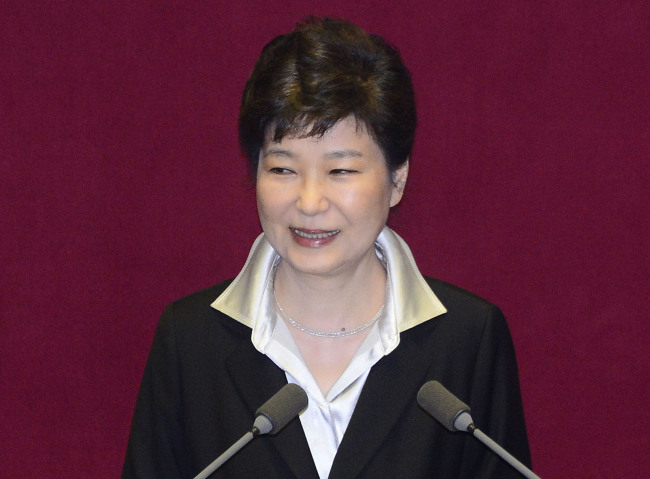South Korean President Park Geun-hye on Monday proposed a constitutional revision in a surprise reversal of her earlier position, a move that observers say reflects her will to spearhead the growing debate on the highly divisive issue.
During her parliamentary speech to outline budget plans for next year, Park said her government will institute a body to prepare for the revision with a view to achieving it within her term in office that ends in February 2018.

(Yonhap)
Park had previously opposed any full-fledged discussions on the highly polarizing issue, saying that the government should focus on tackling more urgent economic and security issues, including North Korea's ever-growing nuclear and missile threats.
The chief executive, however, underscored that given political schedules, including the presidential election slated for next year, now is the "right time" to push for rewriting the Constitution, last amended in 1987.
Park, in particular, stressed the need for a change in the current single five-year presidential term, which has made politics extremely confrontational and the government unable to pursue consistent, sustainable policy goals.
"The single, five-year presidential term under the Constitution, which has been in force for the last there decades since its last amendment in 1987, might be suited for the past democratization period, but it has now become clothes that no longer fit our body," the president said.
"With the political system in which we cannot move a step forward due to confrontation and division, we cannot expect a bright future for the country," she added.
Park also noted that the change of government in the South every five years has made it difficult to pressure the North into renouncing its nuclear ambitions, and that frequent policy shifts have gotten in the way of economic leaders carrying out long-term, stable business initiatives.
Her proposal came amid increasing calls for a major shift in the way the country is run. Proponents have said that the revision should take place, as the current constitution does not reflect the raft of social and political changes that have transpired over the years.
The debate over the revision centers on spreading out power that is now concentrated in the president, a point on which many politicians from the ruling and opposition parties alike largely agree.
But political circles are split over how to alter the Constitution, foreshadowing an intense debate before they build consensus over the crucial issue.
Kim Jae-won, senior presidential secretary for political affairs, told reporters that Park ordered preparations for the revision at the end of the Chuseok holiday, or Korean thanksgiving, last month.
Kim also said that, if necessary, the president can table a bill for the amendment. But she has not determined how the Constitution should be altered considering the importance of building national consensus, Kim explained.
He added that Park intends to lead the schedule related to the revision process.
"I believe that the president can spur the discussions on the revision by expressing her opinion or will towards it, if discussions (at the legislature) become lackluster due to the conflict over political interests," the presidential aide said.
Touching on the budget plans, Park urged the Assembly to meet the deadline for their budget deliberations, which falls on Dec. 2, a date that has been set under the Constitution, but frequently missed by lawmakers due to partisan wrangling.
"I ask the 20th National Assembly to meet the legal deadline for its first budget deliberations and to give hope of new politics to people by settling pending issues through dialogue and compromise," she said.
The government has asked the legislature to approve 400.7 trillion won ($353.3 billion) in spending for 2017, up from 386.4 trillion won assigned for this year. It marks the first time that the government's proposed budget has exceeded the 400 trillion-won mark.
"To overcome current economic and security challenges and lay the foundation for the 30-year growth of the next generation, we have drawn up budget plans in the maximum expansionary way -- within the range that does not undermine our mid- and long-term fiscal health," she explained.
Following her speech, the Assembly began its 40-day deliberations on the budget proposal.
Explaining the focus of the government's budget plans, Park stressed the need to turn the country's economic system into one that leads other nations rather than following others.
To this end, the country should continue to push for finding new growth engines and overcoming the repercussions of the ongoing restructuring of major industrial sectors.
"Before the negative impact of the low birth rate and aging population comes to the fore, and before our economic growth rate is fixed at the 1-2 percent range, our nation should create an economic system that leads (others)," she said.
Describing the current security landscape on the Korean Peninsula as "grave and grim," the president called for parliamentary support to quickly secure a budget for the timely procurement of key defense systems such as the Kill Chain strike system and the Korea Air and Missile Defense system. (Yonhap)






![[Graphic News] More Koreans say they plan long-distance trips this year](http://res.heraldm.com/phpwas/restmb_idxmake.php?idx=645&simg=/content/image/2024/04/17/20240417050828_0.gif&u=)